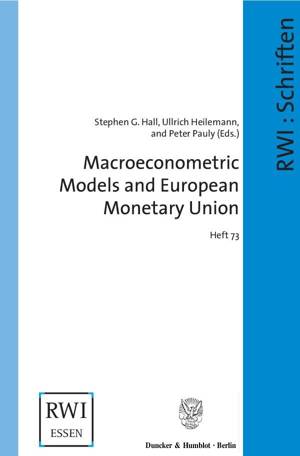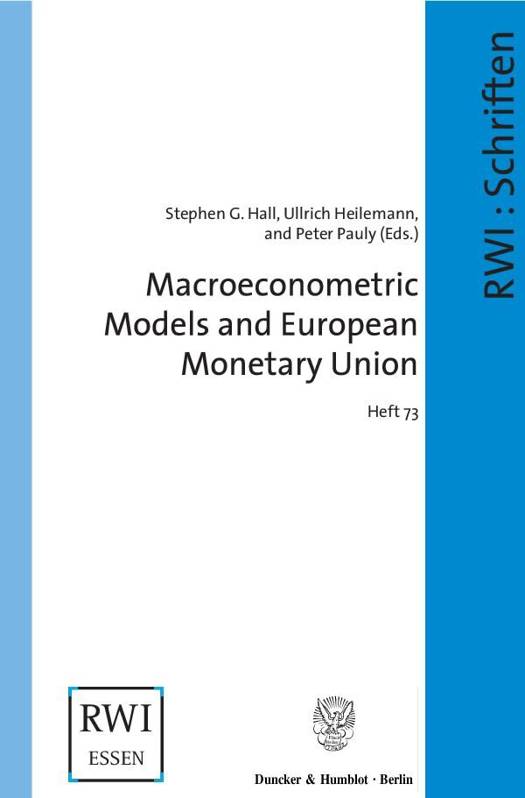
En raison d'une grêve chez bpost, votre commande pourrait être retardée. Vous avez besoin d’un livre rapidement ? Nos magasins vous accueillent à bras ouverts !
- Retrait gratuit dans votre magasin Club
- 7.000.000 titres dans notre catalogue
- Payer en toute sécurité
- Toujours un magasin près de chez vous
En raison de la grêve chez bpost, votre commande pourrait être retardée. Vous avez besoin d’un livre rapidement ? Nos magasins vous accueillent à bras ouverts !
- Retrait gratuit dans votre magasin Club
- 7.000.0000 titres dans notre catalogue
- Payer en toute sécurité
- Toujours un magasin près de chez vous
Macroeconometric Models and European Monetary Union
73,95 €
+ 147 points
Description
This volume contains the contributions of a conference dealing with the consequences of the European Monetary Union for the macroeconometric modelling of the Euro area, which took place in Essen in 2000. At the end of the conference the participants were convinced that the discussions including a great variety of theoretical, methodical and factual aspects from the producers' as well as the consumers' perspective will not fail to have a certain impact on the future development of macroeconometric modelling in the Euro area.
Once more it became clear, however, that an ideal way to a solution of the problems is still not in sight. The future development will be characterized by a plurality of approaches and models. Thus trends continue which have had a more or less strong, durable or temporary influence on the model landscape since the emergence of the monetarist revolution, the "rational expectations" or the "real business cycle"-models. We are still at the beginning of the theoretical and empirical exploration of the macroeconomic development of the Euro area, it is not always clearly perceptible what is transitory and what is permanent, and this openness should facilitate the reception of the experiences and results which have been presented.
The idea for this event was developed in the course of the Project LINK. One of the highlights of the conference was the participation of the nobel prize winner Professor Dr. Lawrence Klein - pioneer and Nestor of macroeconometric modelling - who, as his contribution shows, is following up the creation of the European Monetary Union with critical interest.
Once more it became clear, however, that an ideal way to a solution of the problems is still not in sight. The future development will be characterized by a plurality of approaches and models. Thus trends continue which have had a more or less strong, durable or temporary influence on the model landscape since the emergence of the monetarist revolution, the "rational expectations" or the "real business cycle"-models. We are still at the beginning of the theoretical and empirical exploration of the macroeconomic development of the Euro area, it is not always clearly perceptible what is transitory and what is permanent, and this openness should facilitate the reception of the experiences and results which have been presented.
The idea for this event was developed in the course of the Project LINK. One of the highlights of the conference was the participation of the nobel prize winner Professor Dr. Lawrence Klein - pioneer and Nestor of macroeconometric modelling - who, as his contribution shows, is following up the creation of the European Monetary Union with critical interest.
Spécifications
Parties prenantes
- Editeur:
Contenu
- Nombre de pages :
- 224
- Langue:
- Anglais
- Collection :
- Tome:
- n° 73
Caractéristiques
- EAN:
- 9783428113989
- Date de parution :
- 02-02-04
- Format:
- Livre broché
- Format numérique:
- Trade paperback (VS)
- Dimensions :
- 165 mm x 239 mm
- Poids :
- 370 g

Les avis
Nous publions uniquement les avis qui respectent les conditions requises. Consultez nos conditions pour les avis.





